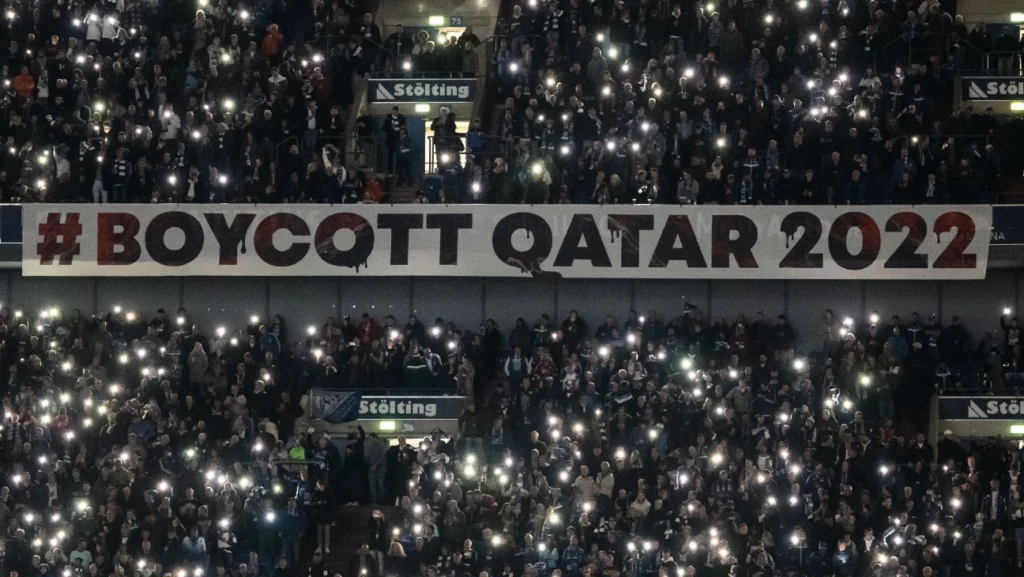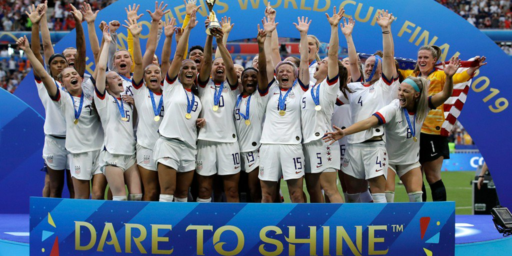The Qatar World Cup and Broad Drawing Conclusions From Unique Events
Sports fans enjoy watching sports. How much does politics impact that?

Hollywood Reporter had a story headlined “Controversy around the Qatar World Cup hasn’t hurt ratings in the US, Canada, France, Japan, and the UK; Fox’s viewership is up 78% from 2018” but renamed it “Is Critical Coverage Hurting World Cup Ratings?” Alas, we’re comparing apples to walnuts.
Controversy has swirled around this year’s soccer World Cup in Qatar. From accusations of bribery and fraud in granting the tournament to the tiny, wealthy Mid-East nation, to criticism of Qatar’s persecution of its LGBTQ+ community and its treatment of migrant workers.
This is true.
But, judging by viewership figures after the first week of matches, the critical coverage hasn’t hurt the ratings much.
And, really, why would it?
I happen to believe we shouldn’t host international sporting events in countries with poor human rights records. But autocratic countries are often willing to overpay for the privilege of losing money to host an Olympics or World Cut to bask in the prestige and the governing bodies of those events are notoriously corrupt.
But here’s the thing: Fox has already paid for the rights to broadcast the World Cup, just as NBC has for the last several Olympic Games. My boycotting watching them on television—even if it were replicated en masse by others—would punish the broadcasters, not the host country. Refusing to travel to Qatar to watch the games, on the other hand, sends a powerful, impactful message.
In the U.S., broadcasters Fox Sports and Telemundo, who are carrying the tournament in English and Spanish, respectively, have got off to a strong start. Sunday’s opening match between hosts Qatar and Ecuador was watched live by an average of around 7 million people across both networks. An average of 4 million tuned in to Spanish-language broadcasts on Telemundo, Peacock and Telemundo Deportes’ digital platforms, a 164 percent increase on the 2018 World Cup opener between Russia and Saudi Arabia. English-language viewership on Fox was up 78 percent on the 2018, with a peak of 3.5 million catching the match, compared to 1.7 million who watched the opening game in 2018.
The problem with this, though, is that it’s not obvious how apt the comparisons are, much less how we would disaggregate the effects of disdain for Qatar’s horrible human rights record compared to those of 2018 host (checks notes) . . . Russia and its horrible human rights record.
For one thing, the United States team failed to make the tournament last go-around. That almost diminished interest in the United States; I know I didn’t watch any of it.
And, frankly, if you’re someone who cares both about soccer and human rights in Qatar, tuning in to watch the host team—which only got in because it automatically qualifies—get their asses kicked in the opener might be too hard to pass up.
But things really took off when the United States played Monday. Nearly 12 million viewers on Fox and Telemundo caught the 1-1 draw with Wales, with an average of 8.3 million watching on Fox across its broadcast and digital platforms and 3.4 million on the Spanish-language service.
I have no idea what the comparison is but, offhand, that seems really good for a game played at 2 o’clock Eastern on a Monday.
Fox has been careful to avoid any criticism of host nation Qatar, with on-air hosts ignoring any and all controversial topics. Fox has a sponsorship agreement with sponsorship agreement with Qatar Airways and several Visit Qatar tourism spots have run during the channel’s World Cup coverage, but Fox has denied its sponsorship deals are influencing its coverage.
North of the border, Canada’s opening match against Belgium drew an average 3.7 million viewers on sports channel TSN, the main CTV network and the French-language RDS channel.
TSN-parent Bell Media says that audience made the game the most-watched World Cup group stage match on record, citing overnight data from Numeris (Canada’s Nielsen). Last time Canada appeared in World Cup was in 1988. The opener was the second-most-watched sports broadcast of the year in Canada, behind only Super Bowl LVI.
Overall, the match reached 8.9 million viewers, or around one-in-four Canadians watching some or all of the live broadcast, which ended with a 1-0 victory for Belgium.
Even if you really care about human rights in Qatar, if you’re a Canadian sports fan, it would be hard to pass up watching the national team play in the most important tournament in the world after a 34-year absence. And, again, boycotting it would have no impact at all on Qatar—they got paid for licensing the rights, not a cut of the advertising revenue.
All-sports network TSN avoided discussion of human rights in Qatar and other controversies, but the CTV News anchor Omar Sachedina was on the ground in Doha to report on political stories, including around migrant workers and restrictions on visiting soccer fans, CTV’s W5 news magazine show on Nov. 26 will feature a segment that explores the World Cup’s host country, including discrimination and abuse concerns in oil-rich Qatar, leading up to the tournament.
In Britain, the BBC has taken a stronger stance on issues in Qatar, shifting coverage of Sunday’s opening ceremonies off its main channel in favour of a human rights message presented by host Gary Lineker.
But that position hasn’t appeared to dampen the British appetite for World Cup soccer. A peak of 8 million tuned into the BBC to watch England hammer Iran 6-2 in its first match of the competition on Monday. While significantly down on the ratings for team’s opening game against Tunisia at the 2018 World Cup in Russia — which peaked at 18.6 million — it should be noted that that game was played in the evening, while the Iran match was at the broadcast well outside primetime at 1 pm in the U.K.. The BBC said a further 8 million people streamed Monday’s match on iPlayer.
With a primetime slot of 7 p.m. on Friday and up against their centuries-old foe, England’s match against the U.S. should prove be a much bigger draw, although the overall figure could be unknown due to large numbers expected to watch in pubs.
Again, none of this is surprising. England literally invented soccer. It’s the world sport but it’s especially theirs. The Three Lions are considered among the favorites to win it all. Of course there’s going to be heavy interest in the quadrennial tournament. But, yes, since the 2018 tournament was hosted in Eurasia and this year’s in the Middle East, the time zones are less favorable this go-around.
Ah, but there’s a countervailing example!
In Germany, however, where official World Cup broadcasters ARD and ZDF have reported extensively on human rights abuses in Qatar and on calls to boycott the tournament, viewership so far has been sharply down on previous World Cups.
The German team’s surprise 1-2 defeat to Japan on Wednesday drew just 9.2 million viewers on ARD, although the early kick-off time —2 PM in Germany —may have also played a role. The audience was a fraction of the nearly 26 million that watched Germany’s opening match of the 2018 World Cup in Russia (which also the Mannschaft go down in defeat, 0-1, to Mexico).
Sunday’s opening match, which hosts Qatar lost 0-2 to Ecuador, drew just 6.2 million German viewers on ZDF. To compare: more than 10 million Germans watched the Russia vs. Saudia Arabia opening match in World Cup 2018.
In the team photo ahead of the match, Germany’s players covered their mouths in a silent protest against soccer governing body FIFA, which had threatened to sanction players if they wore a rainbow-colored “OneLove” armband as part of campaign to raise awareness about LGBTQ+ rights. Consensual relations between members of the same sex are illegal in Qatar. FIFA claims the armband violates its ban on “political symbols.”
“Even without the armband, our position stands,” read the official tweet from the German Soccer Association (DFB), with a picture of the players covering their mouths. “We wanted to set an example for values that we live in the national team: diversity and mutual respect. To raise our voices together with other nations. This is not about a political message: human rights are non-negotiable.”
While German players didn’t don the OneLove armband, German Interior Minister Nancy Faeser proudly wore hers as she watched the match, sitting next to FIFA President Gianni Infantino.
The OneLove controversy has already cost Germany: one of the national team’s sponsors, the supermarket chain Rewe, cancelled their deal with the German Soccer Association after the team bowed to FIFA’s demands to drop the armband.
“We stand for diversity and soccer is also diverse,” said Rewe boss Lionel Souque, in a statement. “FIFA’s scandalous behavior is for me, as a CEO of a diverse company and also a soccer fan, completely unacceptable.”
After Germany’s loss to Japan, some in the local media blamed the debate around the OneLove armband and the team’s pre-game protest.
“There was too much drama in the build-up, too many issues that were more important than football, much like four years ago [when Germany went out in the first round], opined former Germany captain and 1990 World Cup champion Lothar Matthäus in the tabloid Bild. “That sort of thing disturbs your concentration, it distracts – and thus means you may lack the crucial five or 10 per cent.”
I honestly have no idea whether the team’s minor political activities were a distraction. But it’s hardly surprising that the host nation cracked down on pro-LGBTQ protests and that FIFA heavily enforced its policies against politicizing the event, given how much Qatar paid for a monthlong sportswashing.
I strongly suspect that the average German soccer fan wasn’t going to be dissuaded from rooting for the national team—a lesser favorite than England but a historical power in the sport. Regardless, one can’t easily compare a game in the middle of the workday to a prime time game four years apart.
There are more examples from other countries in the report. The same analysis applies: we really need more than simple 2018 vs 2022 ratings to assess what impact, if any, Qatar being a slightly more repressive country in some ways than Russia had on fan enthusiasm.






I’ve boycotted every World Cup since 1990.
John Oliver did an ep on FIFA and Qatar recently on Last Week Tonight. I love that show.
Before the World Cup 99% of the world didn’t know there was such a thing as Qatar. Now many more people know that Qatar exists. And that it’s a hellhole for everyone but the rich.
I’m amused by the belief in Saudi Arabia, the UAE and Qatar that spending billions on mega projects will make them real countries. They’re trying to create cities, even a civilization, by dictate. Won’t work. You cannot buy a functioning city, you can only build a hollow simulacrum. You cannot create a civilization in which a small number of parasitic natives are surrounded by slaves – not in the modern world.
And I’m sorry, but excellent airlines and luxury hotels do not a tourist industry make. 100 degree temperatures work for Las Vegas because a) it’s not humid, and b) there’s a whole bunch of lovely vice to be pursued. Imagine Vegas without gambling, booze, risqué shows and hookers – it’s called Bakersfield.
30 years from now all those tall, shiny buildings will be monuments to the folly of dictators.
Incidentally, we’ve been approached a couple different times to attend a literary conference in the UAE. We’ve refused on the grounds that we are not interested in helping to make thug states appear normal. Currently rejecting requests from Texas and Florida on similar grounds.
@Michael Reynolds:
No, it is not a hellhole for anyone but the rich – wild exaggeration is foolish.
It’s a horrid place for construction labour – but if you are a worker in other segments it’s not great but hardly a hell-hole, particular as compared to labour conditions for similar work in workers coming from India, etc. (which is not it should be said a very nice benchmark).
And if you are not in labour but market services, working there can allow you to go home to Sri Lanka etc (or England) with quite nice savings.
Not in any fashion a fan of Qatar, but wild exaggeration about conditions is nothing more than propaganda. Tedious place but not a hell-hole.
Dubai (rather than wider UAE) has managed to construct something – not something I particularly like and undergirded by absuses for working labour – but is functioning – a sort of modern version of the international city
@Lounsbury:
Rather depends on your definition of ‘hell hole.’ Let’s start with the climate which is described as unbearably muggy most of the year, and barely-tolerable the rest of the year. Then look at the human rights situation, which is appalling. And the treatment of women, which is also appalling. And the fact that this is a modern slave state. Then, remove beer, wine and whiskey. Let’s not forget the complete absence of anything like democracy.
And finally – and I’m admittedly basing this solely on the food available at the Doha airport business class lounge – the food is also appalling. Qatari lettuce, the stuff of nightmares.
So, horrible climate, horrible treatment of women, gays, political dissidents, and migrant workers who make up the majority, de facto slavery, authoritarianism, no beer and shitty food. I don’t know where you live, but where I live the climate is wonderful, people are free, I can drink beer and smoke weed, and the food is excellent. Compared even to troubled Los Angeles, Qatar is my definition of a hell hole.
@Michael Reynolds: But you’re a Lefty, so your opinion doesn’t count. 😉
ETA: And is automatically wrong, too. 🙁
I’m a self-righteous hypocrite. I draw lines in the sand based not on values, but rather more on preferences, conveniences, etc.
Soccer is my game. It’s the best game. Thus, I watch this World Cup with only pleasure, no guilt.
I will, of course, boycott the F1 Saudi Arabian Grand Prix in March 2023. Just can’t stomach the human rights violations.
If I was on twitter…no, wait…mastodon, I would proudly and loudly celebrate my sacrifice and moral clarity.
My aversion to soccer goes back to my gradeschool days in the ’50s. Before the fourth grade I did not know the game existed. My physical education coach for grades 4, 5 and 6 was a fanatic. Coach Cobb told us: “Soccer is the game of the future! When you all graduate from high school in 1966 there won’t be any more football or baseball or basketball. Every one will be watching soccer matches!” When gym class was outside and we wanted to play baseball we had to play soccer. When it was cold and snowing (pretty much every day all winter in Rochester NY) and we wanted to play basketball we played pin soccer. Two pins were set about 10 feet apart at each end of the gym and players kicked the ball to knock a pin down to score. I couldn’t believe that kicking the ball down field was called dribbling. What blasphemy!
Many years later the US was involved some soccer tournament. World Cup? I don’t know. The first round was being held somewhere in Europe I guess as the local Buffalo Wild Wings was opening three hours early at 8am to accommodate fans. The US was playing some team from Africa, South America? Can’t remember. The draw for me was that the General Manager, Nutty, was going to serve up his off menu private recipe biscuits and sausage gravy for breakfast. For some unknown reason I figured I should give Team USA a chance. What a bust! After 90 minutes 0-0. Then there was an overtime. Still 0-0. Then penalty kicks? if that’s what they are called till they all fell dead on the pitch.
Still 0-0. That’s how the game ended. 0-0!
Unbelievably each team got a point and advanced in the tournament! I thought for sure both teams would be eliminated! What a waste of time!
The biscuits and gravy were excellent!
@Mister Bluster: Yeah, I remember the glory days of European-style-play-for-the-tie
footballAmerican soccer. I was a fan in those days; soccer being the only team sport I was even passably bad at (let alone good), but a couple of years of NASL pretty much finished off my interest in watching soccer until I got to Korea. And “my” team (the Seattle Sounders) played the New York Cosmos in the first ever sporting event at the Kingdome (1976).And the above factoid probably constitutes most of my history as a professional sports fan.